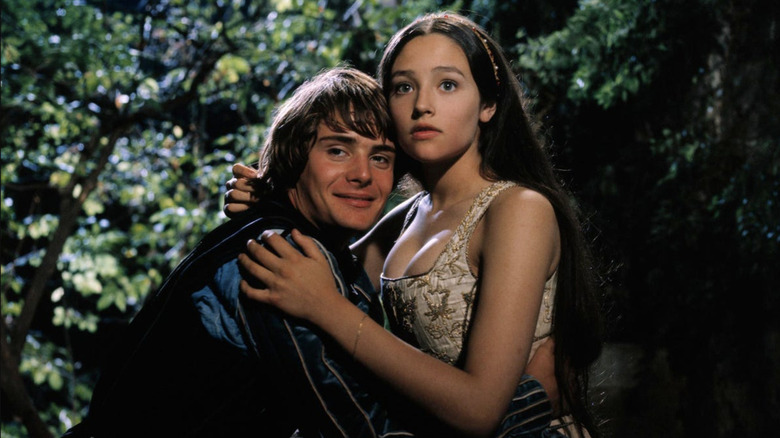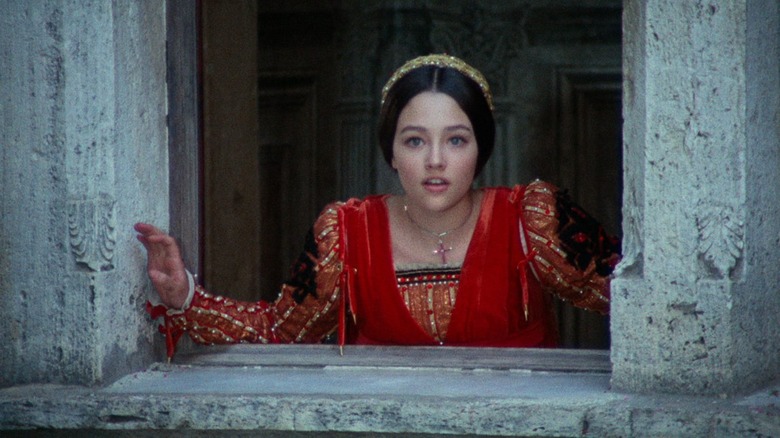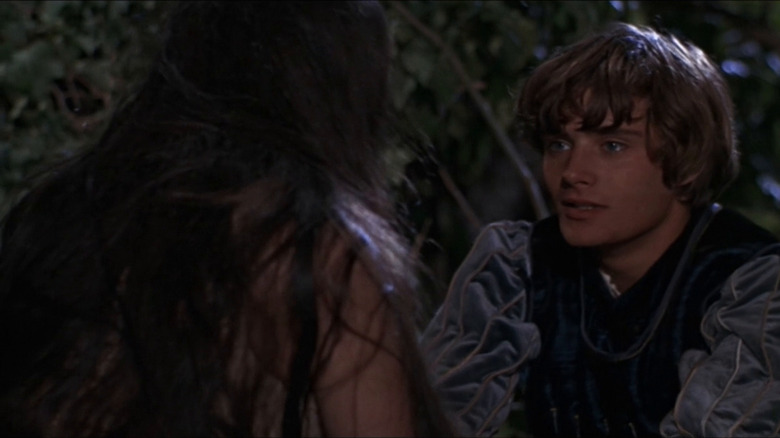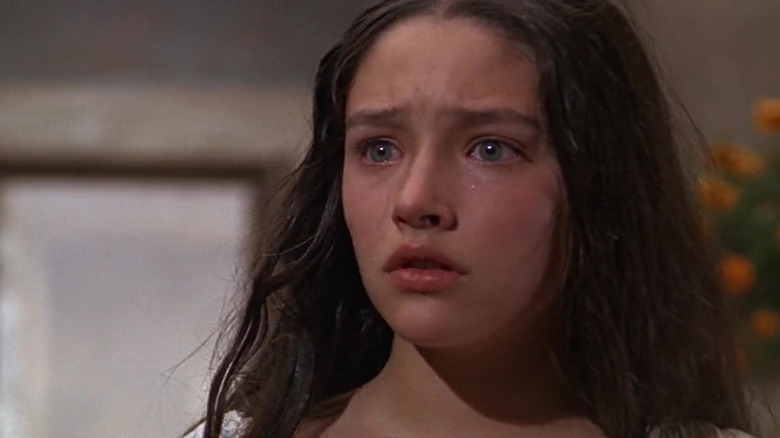1968's Romeo & Juliet Actors Sue Paramount For Child Abuse Over The Film's Nudity
There are a handful of films that seemingly every American high schooler watches at some point in class, but Franco Zeffirelli's 1968 adaptation of William Shakespeare's "Romeo and Juliet" starring Olivia Hussey and Leonard Whiting is arguably the one most watched. I distinctly remember my teacher warning us not to complain when Hussey lets out a wailing cry lamenting the turmoil between the Capulet and Montague families, joking, "yes, yes, she's very annoying, you'll just have to deal with it." Nowhere in my teacher's laundry list of preemptive warnings did she include the fact both Hussey and Whiting would be shown partially nude during a bedroom scene.
Her defense was that if we knew it was coming, our hormonally charged brains wouldn't be able to focus on the film knowing there was going to be T&A. However, there's a much bigger problem than whether or not some immature high schoolers can handle seeing naked bodies on screen — it's that Hussey and Whiting were both only teenagers when they played the titular characters, meaning everyone who has watched the Academy Award-nominated film has viewed the nude form of underage actors.
Hussey and Whiting are now in their 70s, but according to Variety, they have filed a lawsuit in Santa Monica Superior Court accusing Paramount of sexual exploitation and the distribution of nude images of adolescent children. The suit alleges that the deceased Zeffirelli had assured both actors that they would wear flesh-colored undergarments during the scene to prevent nudity, but allegedly suggested they perform in the nude on the day of shooting or else "the Picture would fail."
'What they were told and what went on were two different things'
Olivia Hussey was only 15 years old at the time of playing Juliet, while Leonard Whiting was 16. The complaint alleges that director Franco Zeffirelli had shown the actors where the camera would be positioned and promised there would be no nudity photographed or released, which is obviously not what happened as the final cut showcases the nudity of both actors.
"What they were told and what went on were two different things," Tony Marinozzi, a business manager for both actors, told Variety. Marinozzi talked about the trust these teenagers had in the director, how that trust it was taken advantage of, and the power imbalance that existed between the young actors and the director:
"They trusted Franco. At 16, as actors, they took his lead that he would not violate that trust they had. Franco was their friend, and frankly, at 16, what do they do? There are no options. There was no #MeToo."
The complaint alleges that Hussey and Whiting have suffered "mental anguish and emotional distress in the 55 years since the film's release," as well as a loss of job opportunities. It is believed that the pair are seeking damages "believed to be in excess of $500 million." Considering the countless number of people who have seen "Romeo and Juliet" just from educational viewings alone, this high price tag seems perfectly acceptable.
Past comments do not erase the reality of what happened
Solomon Gresen, the attorney for both Hussey and Whiting, was reported by Variety as saying, "nude images of minors are unlawful and shouldn't be exhibited." Gresen added, "These were very young naive children in the '60s who had no understanding of what was about to hit them. All of a sudden they were famous at a level they never expected, and in addition, they were violated in a way they didn't know how to deal with." California law recently temporarily suspended the statute of limitations on older claims of childhood sexual abuse, which sparked an influx of complaints against the Catholic Church, the Boy Scouts of America, and the "Romeo and Juliet' case.
The frustration lies in how people are already trying to use Hussey's previous comments about the scene as a way to ignore or excuse the very real crime that had occurred. In a 2018 interview, Hussey told Variety, "Nobody my age had done that before," and added, "It was needed for the film." Sounds a lot like Shelley Duvall's comments about her mistreatment during the production of "The Shining."
That same year, Hussey had told Fox News that while the scene was "taboo" in America, it was very common in Europe. This is true, but the massive difference here is that the age of consent in 1968 America was 21 years old. Let's play Devil's Advocate and say that the two were fine with the nudity at the time — it doesn't change the fact that these two teenagers were failed by the adults in charge of the production who should have known better than to exploit their underage performers. Yes, it was "a different time," but there were consent laws in place that were willfully violated.
Hussey and Whiting should win their case
Olivia Hussey and Leonard Whiting are not the first actors to speak out against the nude scenes filmed during adolescence. Brooke Shields has spoken out at length regarding the film "Blue Lagoon," which showcased explicit content featuring the actress as a 14-year-old. Regardless of how many years have passed since the film was released, Hussey and Whiting are right to hold accountable the people who have profited off of the exploitation of their underage bodies. There's a short monologue from the Patrick Wilson and Elliot Page horror flick "Hard Candy" that perfectly describes this situation:
"It's just so easy to blame a kid, isn't it? Just because a girl knows how to imitate a woman, does NOT mean she's ready to do what a woman does. I mean, you're the grown-up here. If a kid is experimenting and says something flirtatious, you ignore it, you don't encourage it. If a kid says 'Heeey, let's make screwdrivers' you take the alcohol away and you don't race them to the next drink!"
The uncomfortable truth is that sexuality is absolutely a part of life for many teenagers, and exploring those realities on screen can make for powerful storytelling. However, this is why it's important to prioritize the safety of actors over "authenticity." Two of the best showcases of the exploration of budding sexuality in recent years were in the film "Yes, God, Yes" and the hit TV series "Pen15," but in both instances, hired actors who were of legal age so as to not exploit children. "Romeo and Juliet" is a phenomenal retelling of Shakespeare's classic play, but the scene in question is readily available on Tube Sites, while the feature film requires a VOD rental.
I hope they win.



